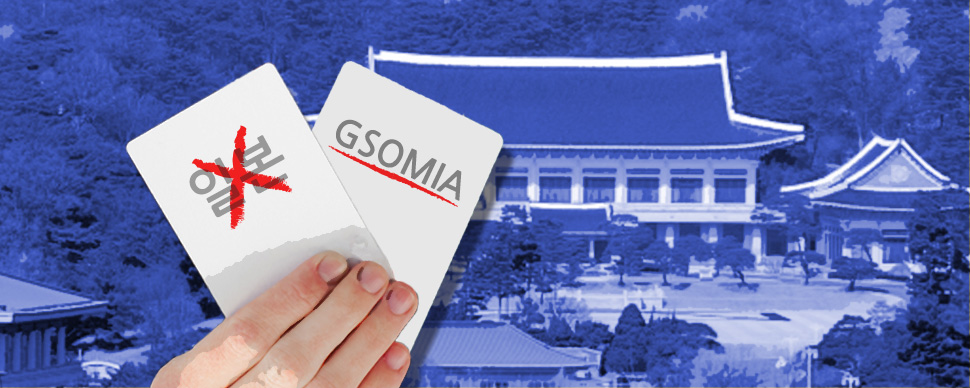Posted on : Aug.23,2019 11:13 KST
Modified on : Aug.23,2019 12:25 KST
Amid tougher measures and higher tensions, arranging negotiations won’t be easy
The South Korean government’s decision to terminate its information-sharing agreement with Japan, called the General Security of Military Information Agreement (GSOMIA), is expected to further heighten tensions in the economic war between the two countries that began at the beginning of July. The two countries’ disagreement over Japan’s colonial legacy has escalated beyond the economy into the areas of diplomacy and security, inevitably inciting more uncertainty in the South Korean economy.
The revision to Japan’s export and trade management rules that dropped South Korea from the “white list” of countries that enjoy expedited screening for the export of strategic materials will take effect on Aug. 28. South Korea announced a corresponding measure on Aug. 14 that will remove Japan from its own white list, with opinion canvassing scheduled to conclude on Aug. 2. The South Korean government decided to remove Japan from its white list on the grounds that Japan’s unilateral tightening of its export controls are a violation of the Wassenaar Arrangement and other multilateral export control regimes, which encourage extensive deliberations between member states and discourage them from obstructing innocuous transactions in the private sector.
The economic war between these two countries, which had proceeded through tightening export controls on strategic materials, has unfolded without either side giving an inch, at least officially. But more recently, Japan has made what could be taken as conciliatory gestures, in a nod to international criticism. Japan’s Ministry of Economy, Trade, and Industry has granted export permits on two occasions for extreme ultraviolet (EUV) industrial photoresist ordered by Samsung Electronics before the end of the official 90-day screening period. In recent days, Japanese Minister of Economy, Trade, and Industry Hiroshige Seko also indicated his willingness to hold deliberations at the director general level, under certain conditions.
But the South Korean government’s termination of GSOMIA has effectively torpedoed any chance of bringing the two sides to the negotiating table to find a solution to their economic conflict, at least for the time being. Higher tensions between the two countries make it more likely not only that Japan’s revision to its export and trade management rules will go forward as planned but also that it will continue its economic retaliation, perhaps by imposing more export controls.
For now, the biggest question is how far Japan will go in the next round of tit for tat. Dropping South Korea from its white list on Aug. 28 gives Japan the flexibility to tighten its regulations at any time, by delaying or simply not issuing export permits for strategic materials of its choosing. If Japan expand its export controls beyond key materials used in the manufacture of semiconductors and displays, the conflict is sure to intensify. While some have voiced concerns that Japanese banks could take financial retaliation by calling in loans, both the market and the government believe that’s unlikely.
The South Korean government has also threatened payback in the safety and food sectors and in fact is already moving ahead with such measures. If the two countries’ cycle of retaliation takes on a competitive edge, the economic spat could conceivably erupt into an all-out war affecting a gamut of sectors.
“Whatever the reasons, there’s a greater likelihood of the two countries’ trade dispute becoming protracted. Linking this to security has increased uncertainty and risk across all sectors of the economy,” said an official at one of South Korea’s four major conglomerates.
By Choi Ha-yan, staff reporter
Please direct comments or questions to [english@hani.co.kr]









